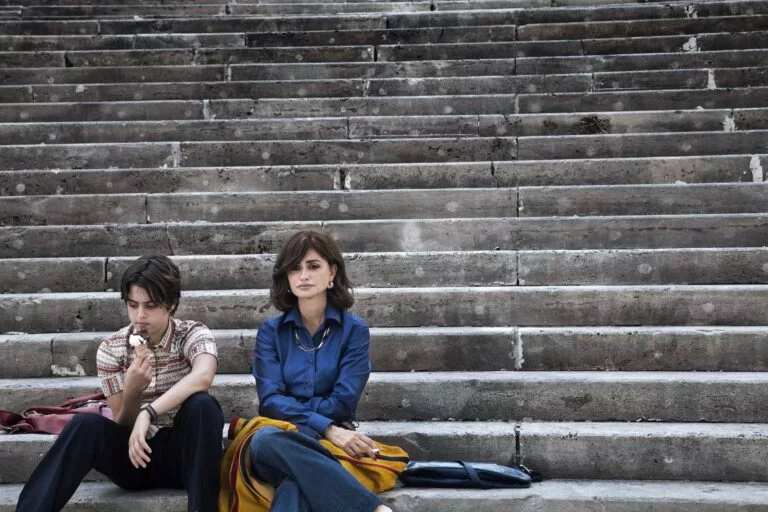
Ubiquitous, polyglot, object of desire of filmmakers on both sides of the ocean, but loyal to friends. The Spanish star accompanies Emanuele Crialese's "L'immensità" to the Lido in which she is a mother in search of freedom and change. Like her teenage daughter. With whom she shot very, very moving scenes.
Luc Dardenne in Addosso alle immagini, a diary of life and cinema just published by Saggiatore, on the eve of the dress rehearsal of the film Due giorni, una notte, on April 24, 2013, noted an imperative: "De-iconize Marion Cotillard!" A star was breaking into a microcosm governed by her own rules. She had to be brought back to her human dimension. We wait to see L'immensità, Emanuele Crialese's fifth film, in competition at the Venice Film Festival and then in theaters Sept. 15, for confirmation. But we suspect that the question-Dardenne for the Italian director has not arisen. The superstar entering his microcosm, "after all, first and foremost a film about family, about the innocence of children and their relationship with their mother," is Penélope Cruz, a "ubiquitous" diva as the French newspaper Libération recently called her, on the occasion of the passage of a documentary dedicated to her on the Arte channel.
Ubiquity is certainly one of her qualities (at the Venice Film Festival we also find her in the Horizons section, in the Spanish En los márgenes; these weeks she is in Italy on the set of Michael Mann's Ferrari, in which she is Laura, Enzo Ferrari's wife).
Penélope Cruz, as Sophia Loren
Another quality she does not lack is timing (she confirms this to us in this interview). Always at the right time: when Spanish cinema was regenerating, when Hollywood was opening its arms to migrant talent in the late 1990s (and Penélope would then be the perfect Latina diva for every market, Brazilian, Colombian, Mexican), when worldliness became an indispensable ingredient of diva status (her union with Tom Cruise, the remarriage-to stay within the canons of classic cinema-with fellow actress Javier Bardem, whom she met on the set of Bigas Luna's Ham Ham), and then the 4 Oscar nominations and the win for Woody Allen's Vicky Cristina Barcelona.
Getting loved by Europe and conquering America, without ever really leaving. If there is a story that resembles hers perhaps one has to look to the parable of Sophia Loren. Similar the social class of origin, the dazzling talent, the rise, the impeccable administration of the career, between big films and art cinema, red carpet and millionaire advertisements, Hollywood glamour and earthly matter, conscience, painful history.
Emanuele Crialese's meeting with Penélope Cruz
Emanuele Crialese wrote of his film that "it could only come to life in the encounter, artistic and human, with Penélope Cruz, with her sensitivity and her extraordinary ability to interact with three very young non-actors who had never acted before." Another great actress (but one who rejects that definition for herself), Tilda Swinton, exploiting a sports metaphor when talking about her work concludes, "I am a catcher. It is in listening that I get ideas, not in the confines of a hotel room with a script in my hand. My brain starts working in conversation with others."
Penélope, L'immensità, said Emanuele Crialese, is his most desired and most personal film, "the film I've been chasing forever: it was always 'my next film,' but each time it gave way to another story, as if I never felt ready, mature, secure enough." How do you enter the intimate universe of an author?
"Emanuele and I met in London the first time and a great understanding was immediately sparked, it was like standing in front of an old friend. Forty minutes quickly became three hours. In an instant I felt that I could trust. I realized how important this film was for him, but it was also important for me to become part of this team."
The talent of a family
In the 1970s, the period in which the film is set, she was a child. They were years of transformation, of hope and lost illusions. What memories do you have?
"I was born in 1974, and I remember, especially at the end of the decade, when I had more awareness, those were dream years for me. I was a big dreamer, planning my whole future life. There was music in the house and we watched a lot of movies, my father recorded everything in super8, took photos and videos. None of us children thought back then that we would become artists (Cruz has a sister Mónica, an actress and dancer, and a brother, Eduardo, a musician, ed.), but I was already attending ballet classes at age 4, and I was a big fan of opera, while my father was crazy about movies. Those years coincided with the realization: I wanted at all costs to represent something within that world. If I then succeeded, I owe it all to my family and that historical moment."
The film has at its heart the relationship between a mother and a daughter. And the desire of both for a different life: an alternative to the family for the mother, another identity for the daughter. What did you bring of yourself to the character?
"I don't know if I can answer that question. To the assumption that I might have conceived this story differently if I were not a mother. I am who I am, with the life I've led, what I have behind me, the lessons I've learned, the traumas I've endured, the relationships I've had, everything that has made me who I am today and given me the insight I have into this story. And Emanuel has allowed me to see all of this from a place that is my own, especially the relationship, because, to answer your question, it's true, mother and daughter try to escape reality, both of them feel in prison. This is what creates the connection between them, especially in the musical scenes where they imagine they are different. Scenes that were even more moving for me when I saw the finished film: during that screening I felt that those were the saddest scenes in the film. Because as a viewer you see where those two people want to go, how far they deserve that freedom, how creativity is part of them, the desire to be what they really feel they are intimately. This is one of the movies I cried over the most, watching it I cried at least 10 times!"
Today she is speaking in English, but I remember how in Don't Move she spoke our language well. Is it possible that the Spanish accent she retains when she speaks in English represents a distancing from the Hollywood universe of which she is a full part, but with the status of a European actress?
"Having an accent when I work and working on the accent to turn it into something different is one of my favorite things about my work. For example, now in Michael Mann's film I'm acting in English with an Italian accent, but I've also honed my Spanish with Cuban, Colombian accents… I've done films in four languages in my life, and in each of those languages I've had to work on different accents. The language of a character is one of the most delicate characteristics an actor has to take care of, it requires months of preparation and concentration, when I shot Non ti muovere by Sergio Castellitto, I had to work on it for months, and for many hours a day: I was playing an Italian woman with an Albanian accent, I had to completely cancel the Spanish accent. So many people tried to discourage me. They told me, "You can't do it," but I was happy that all that work was well spent instead. In The Immensity I am a Spanish woman who has lived in Italy for a long time, so my Spanish accent for once I don't have to hide it."
The character, like a puzzle
Have you ever felt that the status of icon, so rare, reserved for the few and the few as much in Europe as in America, concerned you? And that it intimidated those who work with her?
"Icon-I don't know, I never ask myself that when I prepare a character. Every time I start from scratch, I say to myself, "Let's create this new human being that comes from the written page, especially if it's well written, let's start from the blank," and that includes everything, even the way it looks physically, there can be no whims, the character needs everything to move in the world, to walk, to talk, to dress. Every detail is a piece of the puzzle, a layer, an answer to the questions we ask, it cannot be, "How will I look?" It has to be, "How can I give you more truth?" So even a decision about which shoes to choose becomes most important, because it will affect the way you walk, move and thus be. If they are the wrong shoes, the character will pay for it and I will pay for it. The question is never "will they look good or bad on me?" it's always "will they be the shoes she would have chosen?" So I think it would be dangerous to feel like an icon. I feel grateful and lucky that I can be what I always wanted to be: I am an actress, I have interesting job opportunities, I still feel like a student, I learn every day. Yet when I dreamed of this life as a girl I thought it was an impossible dream."
A documentary, Penélope Cruz, les reflets de la passion by Charles Antoine de Rouvre, and a book, Penélope Cruz by Ann Davies, have tried to explore her journey. How do you feel at the thought of becoming a subject of study? To have been an important and new presence at the time when Spanish cinema was changing, with Bigas Luna and Almodóvar, was crucial in its history. What are your memories of it?
"I have not seen the documentary or read the book. I am convinced that the authors had the best intentions when they made them; I had nothing to do with those projects. But about my presence in the Spanish cinema of the 1990s, it is wonderful to have been part of the world of those authors. Bigas died too young, but I made two films with him and we were very close. With Pedro we are 7 films together, and I hope we will make many more, he is a very important person in my life, I adore him, he is part of my family. When I was a child I dreamed that it would happen, but it is difficult to make such specific dreams come true. Instead, it happened. I remember precisely the first time they looked for me. After the audition they sent me home and said, "You're too young, but we'll call you back." There and then I said to myself that maybe it was an excuse, that those are the things you say. Instead they weren't telling lies, they both called me back years later to ask me to make a film with them. That's how it all started."

Written by Michael Zippo
Michael Zippo, passionate Webmaster and Publisher, stands out for his versatility in online dissemination. Through his blog, he explores topics ranging from celebrity net worth to business dynamics, the economy, and developments in IT and programming. His professional presence on LinkedIn - https://www.linkedin.com/in/michael-zippo-9136441b1/ - is a reflection of his dedication to the industry, while managing platforms such as EmergeSocial.NET and theworldtimes.org highlights his expertise in creating informative and timely content. Involved in significant projects such as python.engineering, Michael offers a unique experience in the digital world, inviting the public to explore the many facets online with him.
